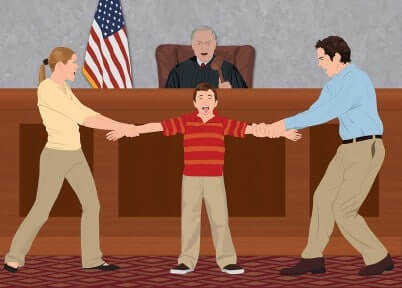Custody disputes can be among the most difficult cases for a Charleston divorce lawyer to handle. The difficulty is often compounded by the family tensions that existed long before the client ever walked in the door, tensions that are often multiplied by either a lack of or misunderstanding of South Carolina custody laws. One frequently misunderstood custody law is that regarding a child’s stated preference to live with one parent or the other. Parents want to know — will this make a difference in my case?
The short answer, as it so often it is in Family Court cases, is “it depends.”
An examination of the long answer starts with the statute itself, SC Code § 63-15-30 (2013) we will break down into its parts for a clearer understanding:
“In determining the best interests of the child, the court must consider the child’s reasonable preference for custody. The court shall place weight upon the preference based upon the child’s age, experience, maturity, judgment, and ability to express a preference.”
1. In determining the best interests of the child, the court must consider the child’s reasonable preference for custody.
As always, the wishes of the child must be measured against what is in the child’s “best interests.” Importantly though, the statute requires a judge to consider a reasonable preference. If there is a stated preference, it seems that it may be error for the Court to not address that stated preference in reaching its ultimate conclusion regarding custody. Note however that this language does not require a judge to simply go along with the stated preference. The judge must consider the preference, but only if it is “reasonable.” What is meant by “reasonable” is defined by the second sentence of the statute.
2. The court shall place weight upon the preference based upon the child’s age, experience, maturity, judgment, and ability to express a preference.
When addressing this portion of the statute with new clients, I often refer to the existence of a sliding scale when it comes to the reasonability of a child’s custody preference. The younger a child is, the greater the burden becomes to satisfy the Court that the child’s maturity and judgment should outweigh the lack of years.
There exists an entire series of cases that weigh in on where the line between age and maturity exists. These cases suggest that, despite best efforts to apply a one-size-fits-all resolution to this issue, no such resolution exists. The youngest child whose opinion appears to have been given great weight was 12, and the Court in its decision noted that he was mature for her age. Another case gave considerable weight to the wishes of a 14 year old, who expressed a genuine desire to not move away with his mother, because he wished to remain in the neighborhood he had grown up in, with his friends, and continue attending the same school. Other case have more or less dismissed the preferences of 11 year old children.
One important factor in any case involving a child’s custodial preference is the perception that a child is being influenced by a desire to live with the more permissive parent. What child wouldn’t want to live in the household where there are no rules, no homework time, and/or fancy cars and clothes in your teen years? A whiff of this by the Court will cast serious question on the child’s maturity and judgment, regardless of age.
Anecdotally, and without much in the way of legal support, my experience as a Charleston divorce lawyer is that once a child reaches the age of 16 and expresses a strong preference, and with all other factors being roughly equal, the child’s wishes will prevail such that the issue is probably not worthy of litigating. Again, anecdotally, I have heard multiple judges look at parents in a courtroom and tell them that, custody order or no, that child is likely going to go where he or she wants to go, and there isn’t much the Court or either parent can do about it. Take that for what it’s worth.
3. How does the child’s preference get expressed?
While not part of the statute, this remains an important consideration. Judges are loath to take testimony from a child, either in a courtroom or in chambers. So typically the stated preference is contained within the guardian ad litem’s report. A GAL is a third party, usually another Charleston divorce lawyer, who is tasked by the Court with investigating a case from the perspective of the child’s best interests (in effect, to be the judge’s neutral eyes and ears in a case). GALs can and do interview children, and will frequently ask older children about their preferences. This preference is then communicated to the Court through the GAL’s report. In other words, don’t expect to put your child on the stand.
In summary, a conservative analysis of the statute regarding children’s custodial preferences, and the case law drawn from it, suggest that beginning at the age of 12, our Family Courts will begin to give some consideration to a the child’s preference given a showing that the child is especially mature. By 14, the child’s preference will be given weight (it seems) unless there is some reason to believe the child is making an immature decision. And by 16, absent other circumstances that would greatly affect the child’s best interests, it appears the child will likely be able to live with the parent of his or her choosing.
If you have any additional questions on this topic, please contact Charleston divorce lawyer J. Michael DeTreville or Patricia O. DeTreville.

Leave a Reply